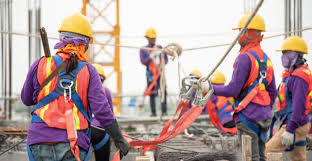Starting a construction project in Orange County—whether a residential home, commercial building, or a multi-unit development—requires careful planning and strict legal compliance. Navigating the complexities of construction law, zoning, permitting, and contracts is essential to avoid delays, disputes, and liabilities. To ensure a solid legal foundation, it's highly recommended to consult with a construction attorney in Orange County before breaking ground. A seasoned legal professional can help you understand your obligations, avoid costly mistakes, and stay on the right side of local and state laws.
1. Understand Zoning and Land Use Regulations
Before you begin designing or budgeting for your project, it's important to verify that your intended use for the property aligns with the local zoning laws. Orange County is governed by multiple municipalities, each with planning departments and zoning ordinances. You'll need to:
Check if the land is zoned for the intended use (residential, commercial, industrial, mixed-use, etc.)Determine the density, setback, and height limitationsUnderstand the permitted and conditional usesApply for any necessary variances or zoning adjustmentsFailing to comply with zoning requirements can lead to project shutdowns, fines, or expensive redesigns. A construction attorney can work with planners and regulators to ensure compliance from the outset.
2. Conduct Proper Site Due Diligence
Before acquiring land or commencing construction, a thorough site evaluation is crucial. This includes:
Environmental assessments (Phase I and Phase II ESAs)Soil testing and geotechnical analysisEasement and encroachment checksUtility availability and infrastructure assessmentsA construction lawyer can help you review these findings, advise you on potential legal risks, and negotiate purchase agreements that protect your interests, including contingencies for zoning approvals or environmental clearance.
3. Secure Permits and Approvals
Construction in Orange County requires multiple permits and inspections from city and county authorities. The type of permits will vary based on the scope and nature of the project, but generally include:
Building permitsGrading and drainage permitsElectrical, plumbing, and mechanical permitsFire and safety inspectionsCoastal Commission approval (for coastal areas)Permit applications must include architectural drawings, structural calculations, energy compliance documentation, and more. An experienced construction attorney in Orange County can coordinate with architects, engineers, and contractors to make sure all applications are correctly filed and compliant with local regulations.
4. Draft and Review Contracts Carefully
Whether you’re hiring a general contractor or multiple subcontractors, clear and enforceable contracts are vital. Poorly drafted agreements often lead to misunderstandings and litigation. Your contracts should include:
Scope of workPayment schedules and retainage termsChange order proceduresTimelines and milestonesInsurance requirementsDispute resolution mechanismsTermination clausesA qualified construction attorney will ensure that your contracts are tailored to California law and local construction norms. They can also help you avoid boilerplate language that might not fully protect your interests.
5. Know Your Responsibilities Under the Right to Repair Act in California
One of the most critical laws impacting construction projects in California is the Right to Repair Act (SB 800). Enacted to balance the rights of homeowners and builders, this law governs the process of resolving construction defect claims.
Under the Right to Repair Act in California, builders and contractors are allowed to repair alleged defects before a homeowner can file a lawsuit. This pre-litigation process includes:
Written notice of defects by the homeownerBuilder’s right to inspect and offer to repairMediation and settlement discussionsThis law sets specific standards for construction quality and establishes timelines for how long builders remain liable for different components (e.g., one year for drywall cracks, and ten years for structural issues). Complying with SB 800 requires accurate record-keeping, consistent communication, and prompt responses to claims.
If you’re developing residential property in Orange County, it's essential to have legal procedures in place for handling warranty and defect claims. Your construction attorney can draft purchase agreements and disclosure forms that align with the Right to Repair Act, reducing the likelihood of litigation and financial exposure.
6. Ensure Proper Insurance and Bonding
Construction projects are inherently risky. Having the right insurance and bonding in place is critical to protecting your investment. Depending on your project, you may need:
General liability insuranceBuilder’s risk insuranceWorkers’ compensation coverageProfessional liability (for architects/engineers)Performance and payment bondsInsurance requirements should be clearly stated in all contracts, and your attorney should review policies to ensure adequate coverage limits and endorsements.
7. Address Labor and Employment Compliance
If your construction project involves direct hiring or working with subcontractors, you must comply with both federal and California labor laws. This includes:
Classifying workers correctly (employee vs. independent contractor)Adhering to prevailing wage laws (for public works projects)Maintaining proper payroll recordsEnsuring workplace safety per Cal/OSHA standardsViolations can result in steep fines, project delays, and legal claims. An attorney can help you stay compliant and avoid missteps that might arise from changes in employment law or misclassification issues.
8. Protect Against Construction Liens
In California, contractors, subcontractors, and suppliers can file a mechanic’s lien if they are not paid for their work or materials. To mitigate the risk of lien claims:
Require lien waivers with each progress paymentKeep detailed payment recordsFile a Notice of Completion promptlyUse conditional and unconditional lien release forms as appropriateA construction attorney can guide you in setting up a lien management process and represent you if a lien is improperly filed or a payment dispute arises.
9. Plan for Dispute Resolution
Even well-managed construction projects can encounter disputes over cost overruns, delays, or workmanship. Your contracts should outline how conflicts will be handled—whether through mediation, arbitration, or litigation. Pre-negotiated dispute resolution clauses can prevent escalation and provide a more efficient way to settle issues.
Having a construction attorney on retainer ensures that you have an advocate ready to step in should disputes arise during or after the project.
10. Post-Construction Legal Considerations
Once construction is complete, the legal work isn’t over. You may need assistance with:
Final inspections and certificate of occupancyWarranty fulfillment and defect responseHomeowner association (HOA) setup, if applicableTransfer of ownership or leasing documentationAdditionally, make sure all documentation—including permits, plans, and legal notices—is archived in case of future claims or resale.
Conclusion
Construction projects in Orange County can be rewarding, but they come with a web of legal considerations that require proactive management. From zoning and permits to contracts and defect laws like the Right to Repair Act in California, it’s easy to get overwhelmed without proper legal guidance. Working with a qualified construction attorney in Orange County helps ensure that your project stays compliant, on budget, and legally protected at every stage.
By following this legal checklist, you’ll be better equipped to navigate the complexities of construction law and minimize risks—so you can focus on building your vision with confidence.








This comprehensive Legal Checklist for Starting a Construction Project in Orange County is an indispensable resource that ensures smooth sailing from the initial stages to successful completion, promoting safety and adherence with local regulations.
Initiating a construction project in Orange County necessitates an exhaustive Legal Checklist to ensure compliance with local regulations, permitting processes and potential legal pitfalls are adequately addressed.
The Legal Checklist provided for starting a construction project in Orange County is an exceptional guide, ensuring compliance with local laws while streamlining the initiation process efficiently.
The Legal Checklist for Starting a Construction Project in Orange County provides an exhaustive framework of legal considerations and requirements, ensuring compliance from the ground up while streamlining project initiation processes.
This Legal Checklist for initiating a construction project in Orange County is an invaluable resource, providing comprehensive guidance on compliancies and ensuring the smooth commencement of any building endeavor.
This Legal Checklist is an invaluable resource for any individual or business initiating a construction project within Orange County, ensuring that legal requirements are met promptly and effectively from the initial phase of groundbreaking to final inspection.
The Legal Checklist for Starting a Construction Project in Orange County offers an exhaustive overview of the legal prerequisites, compliance measures and risk management strategies needed to initiate projects successfully with clarity.
COMMencing a construction project in Orange County effectively requires an extensive yet meticulous Legal Checklist covering everything from zoning permits to environmental compliance, ensuring smooth progress and adherence with local regulations.
The Legal Checklist for Starting a Construction Project in Orange County offers an exhaustive and comprehensive overview, ensuring legal compliance from groundbreaking to completion stages of any building endeavor within the县域.
Here's a concise and informative comment on the topic: Starting an construction project in Orange County necessitates meticulous adherence to its comprehensive Legal Checklist, ensuring compliance with local regulations while skillfully navigating potential legal hurdles.














